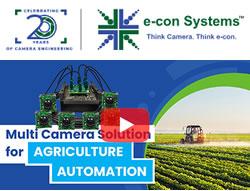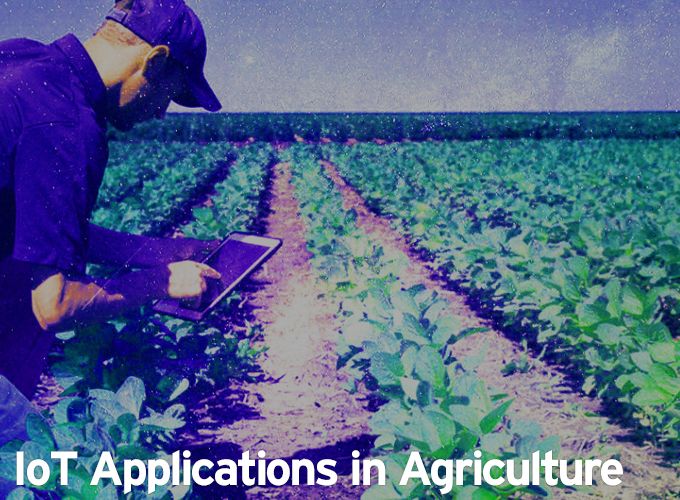The IoT agricultural applications are making it possible for ranchers and farmers to collect meaningful data. Large landowners and small farmers must understand the potential of IoT market for agriculture by installing smart technologies to increase competitiveness
Savaram Ravindra | IoT For All
Reprinted with permission from IoT For All:
The Internet of Things (IoT) has the capability to transform the world we live in; more-efficient industries, connected cars, and smarter cities are all components of the IoT equation. However, the application of technology like IoT in agriculture could have the greatest impact.
The global population is set to touch 9.6 billion by 2050. So, to feed this much population, the farming industry must embrace IoT. Against the challenges such as extreme weather conditions and rising climate change, and environmental impact resulting from intensive farming practices, the demand for more food has to be met.
Smart farming based on IoT technologies will enable growers and farmers to reduce waste and enhance productivity ranging from the quantity of fertilizer utilized to the number of journeys the farm vehicles have made.
So, what is smart farming? Smart farming is a capital-intensive and hi-tech system of growing food cleanly and sustainable for the masses. It is the application of modern ICT (Information and Communication Technologies) into agriculture.
In IoT-based smart farming, a system is built for monitoring the crop field with the help of sensors (light, humidity, temperature, soil moisture, etc.) and automating the irrigation system. The farmers can monitor the field conditions from anywhere. IoT-based smart farming is highly efficient when compared with the conventional approach.
The applications of IoT-based smart farming not only target conventional, large farming operations, but could also be new levers to uplift other growing or common trends in agricultural like organic farming, family farming (complex or small spaces, particular cattle and/or cultures, preservation of particular or high quality varieties etc.), and enhance highly transparent farming.
In terms of environmental issues, IoT-based smart farming can provide great benefits including more efficient water usage, or optimization of inputs and treatments. Now, let’s discuss the major applications of IoT-based smart farming that are revolutionizing agriculture.
Applications of IoT in Agriculture
Precision Farming
Also known as precision agriculture, precision farming can be thought of as anything that makes the farming practice more controlled and accurate when it comes to raising livestock and growing of crops. In this approach of farm management, a key component is the use of IT and various items like sensors, control systems, robotics, autonomous vehicles, automated hardware, variable rate technology, and so on.
The adoption of access to high-speed internet, mobile devices, and reliable, low-cost satellites (for imagery and positioning) by the manufacturer are few key technologies characterizing the precision agriculture trend.
Precision agriculture is one of the most famous applications of IoT in the agricultural sector and numerous organizations are leveraging this technique around the world. CropMetrics is a precision agriculture organization focused on ultra-modern agronomic solutions while specializing in the management of precision irrigation.
The products and services of CropMetrics include VRI optimization, soil moisture probes, virtual optimizer PRO, and so on. VRI (Variable Rate Irrigation) optimization maximizes profitability on irrigated crop fields with topography or soil variability, improve yields, and increases water use efficiency.
The soil moisture probe technology provides complete in-season local agronomy support, and recommendations to optimize water use efficiency. The virtual optimizer PRO combines various technologies for water management into one central, cloud based, and powerful location designed for consultants and growers to take advantage of the benefits in precision irrigation via a simplified interface.
Agricultural Drones
Technology has changed over time and agricultural drones are a very good example of this. Today, agriculture is one of the major industries to incorporate drones. Drones are being used in agriculture in order to enhance various agricultural practices. The ways ground-based and aerial based drones are being used in agriculture are crop health assessment, irrigation, crop monitoring, crop spraying, planting, and soil and field analysis.
The major benefits of using drones include crop health imaging, integrated GIS mapping, ease of use, saves time, and the potential to increase yields. With strategy and planning based on real-time data collection and processing, the drone technology will give a high-tech makeover to the agriculture industry.
PrecisionHawk is an organization that uses drones for gathering valuable data via a series of sensors that are used for imaging, mapping, and surveying of agricultural land. These drones perform in-flight monitoring and observations. The farmers enter the details of what field to survey, and select an altitude or ground resolution.
From the drone data, we can draw insights regarding plant health indices, plant counting and yield prediction, plant height measurement, canopy cover mapping, field water ponsing mapping, scouting reports, stockpile measuring, chlorophyll measurement, nitrogen content in wheat, drainage mapping, weed pressure mapping, and so on.
The drone collects multispectral, thermal, and visual imagery during the flight and then lands in the same location it took off.
Livestock Monitoring
Large farm owners can utilize wireless IoT applications to collect data regarding the location, well-being, and health of their cattle. This information helps them in identifying animals that are sick so they can be separated from the herd, thereby preventing the spread of disease. It also lowers labor costs as ranchers can locate their cattle with the help of IoT based sensors.
JMB North America is an organization that offers cow monitoring solutions to cattle producers. One of the solutions helps the cattle owners observe cows that are pregnant and about to give birth. From the heifer, a sensor powered by battery is expelled when its water breaks. This sends an information to the herd manager or the rancher. In the time that is spent with heifers that are giving birth, the sensor enables farmers to be more focused.
Smart Greenhouses
Greenhouse farming is a methodology that helps in enhancing the yield of vegetables, fruits, crops etc. Greenhouses control the environmental parameters through manual intervention or a proportional control mechanism. As manual intervention results in production loss, energy loss, and labor cost, these methods are less effective. A smart greenhouse can be designed with the help of IoT; this design intelligently monitors as well as controls the climate, eliminating the need for manual intervention.
For controlling the environment in a smart greenhouse, different sensors that measure the environmental parameters according to the plant requirement are used. We can create a cloud server for remotely accessing the system when it is connected using IoT.
This eliminates the need for constant manual monitoring. Inside the greenhouse, the cloud server also enables data processing and applies a control action. This design provides cost-effective and optimal solutions to the farmers with minimal manual intervention.
Illuminum Greenhouses is a drip installation and Agri-Tech greenhouse organization and uses new modern technologies for providing services. It builds modern and affordable greenhouses by using solar powered IoT sensors. With these sensors, the greenhouse state and water consumption can be monitored via SMS alerts to the farmer with an online portal. Automatic Irrigation is carried out in these greenhouses.
The IoT sensors in the greenhouse provide information on the light levels, pressure, humidity, and temperature. These sensors can control the actuators automatically to open a window, turn on lights, control a heater, turn on a mister or turn on a fan, all controlled through a WiFi signal.
Conclusion
Thus, the IoT agricultural applications are making it possible for ranchers and farmers to collect meaningful data. Large landowners and small farmers must understand the potential of IoT market for agriculture by installing smart technologies to increase competitiveness and sustainability in their productions. The demand for growing population can be successfully met if the ranchers as well as small farmers implement agricultural IoT solutions in a successful manner.
The content & opinions in this article are the author’s and do not necessarily represent the views of AgriTechTomorrow
Comments (0)
This post does not have any comments. Be the first to leave a comment below.
Featured Product


